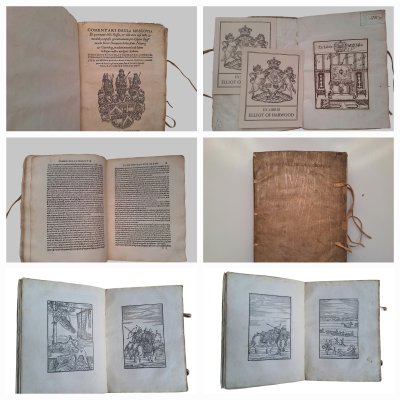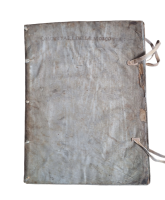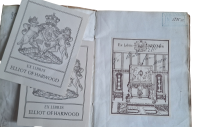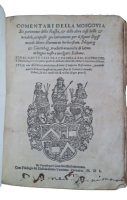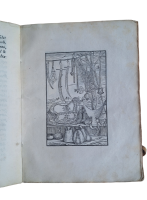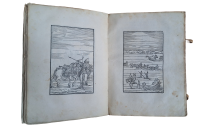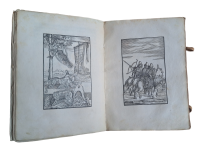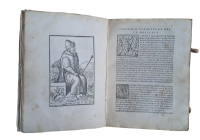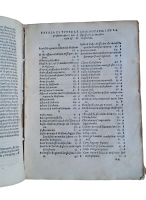Alexandru Matveev
Herberstein Sigizmund Freier von
Commentari della Moscovia
altre cose belle et notabili, composti gia latinamente per il signor Sigismondo libero Barone in Herberstain. Neiperg et Guetnhag, tradotti novamente di latino in lingua nostra vuolgare Italiana.
$9000
Item Details
Venice, Gioan Battista Pedrezzano, 1550, Parchment
2nd edition, Soiling, block cracked, small pieces of Parchment missing.
Herberstein, Sigismund von (1486-1566). “Comentari della Moscovia. Et parimente della Russia, et delle altre cose belle et notabili, composti gia latinamente per il signor Sigismondo libero Barone in Herberstain. Neiperg et Guetnhag, tradotti novamente di latino in lingua nostra vuolgare Italiana. Simelmennte vi si tratta della religione del li Moscoviti, et in che parte quella sia differete dalla nra beche si chiamino chriani. Item una discrittione particolare di tutto L’imperio Moscovitico, toccando ancora di alcuni luoghi vicini, come sono de Tartari Litvuani, Poloni et attri molti riti et ordini di que popoli”. Venetia, Gioan Battista Pedrezzano. Cum Privilegio del illustriss. Senato Venetiano, M.D L [1550]. 4to (20.5 x 15.5cm), Title page, 6 [unnumbered] pages, 7 [unnumbered] pages of the index, blank unnumbered page, 91 pages, 2 [unnumbered] pages + 6 engravings on 3 leaves, of which 2 depict saddles and weapons, 2 depict horsemen, 1 shows sleigh riding, and 1 is a portrait of Grand Duke Vasilii Ioannovich. No map as in most copies.
Early ownership inscription to title-page;library stamp of Bibliotheque C. Narischkine; bookplate of Wed. Allen; inscribed by Allen to Walter Elliott in 1934, Minister of Agriculture, then to Baroness Elliot of Harwood DBE and the Elliot of Harwood Trust by descent.
The book by the Austrian ambassador had a significant influence on the writings of foreigners about Russia. All subsequent works on "Rossica" borrowed his factual material on the history, ethnography, and geography of Muscovy. The great Sigi died in Vienna at the age of 80, covered in honor and glory, unforgettable to both his homeland and to Russia, which owes him eternal gratitude!
The first edition of the Notes was published in Vienna in 1549 in Latin, in folio format, but it is so rare that it remained unknown even to many European sources and writers, with only a few copies in existence. One copy was donated to the former Public Library (now the Russian National Library) in St. Petersburg by G.N. Gennadi in 1853. Gennadi himself had purchased it at a flea market in St. Petersburg.
The unforgettable Adelung, who published an extensive monograph on Herberstein, described this first edition only based on secondhand accounts, never having seen it himself. In Russia, a second copy of the first edition existed only in the library of Count Palen. Gartier called this edition super-unique!
Our Italian translation of 1550 (chronologically the second edition) was printed in Venice and is among the rarest of Herberstein's early publications. Here's what Boris Zabolotskikh writes in his book Book Rarities, Moscow, 1999, p. 216: “A.D. Chertkov’s cherished desire was to acquire a small 14-page book titled ‘The reporte... in the City of Mosco’, printed in London in 1607. It was printed by a Dutch merchant who had lived in Russia for a long time. The only known copy of this book was found in the British Museum Library. Acquiring such a rarity, of course, was unrealistic. However, his rare book supplier, Zaitsevsky, managed to obtain another rarity—one that Chertkov had not even dared to dream of. It was the second edition of Herberstein’s Notes on Muscovy, published in Venice in 1550.”
The significance of this copy is reflected in the annotation from Chertkov’s catalog: “This Italian translation was published only one year after the first Latin edition. It is so rare, even abroad, that both renowned bibliographers, Gebauer and Denis, had never seen it. Our copy lacks the map, as does the one described by Adelung.” This map also drew special attention from Tikhmenev, who noted that it had previously been unknown to any researcher and had only been mentioned vaguely in cartographic records. Some consider the translator of the book into Italian to be the map’s author, Jacopo Gastaldi, whose name appears in the preface and on the map itself; others suggest it was von Corvin.
Venetian engineer Jacopo Gastaldi was one of the most prominent cartographers of the 16th century. Over 25 years of work, he produced several editions of world maps in various formats, immortalizing his name. Gastaldi created his map of Muscovy in trapezoidal projection, framing it with a graduated border. He supplemented the map with information drawn from the text of the book, as well as from foreign sources. In the Neva River basin, new rivers are shown, Lake Ladoga is depicted, and the Dnieper basin is drawn anew. Artistically illustrated forests and mountains create an illusion of perspective. In the corners of the map, outside the frame, various animals are depicted. Why Gastaldi’s map appeared in only a very few copies of the 1550 Venetian edition remains a mystery—one that will become increasingly difficult to solve over time. It is an extraordinary rarity.
Sigismund von Herberstein was born on August 23, 1486, in the castle of Vipach, located in the blessed Austrian region of Carinthia. It was here, in the mountains of Slavic Carniola, that the future author of Notes on Muscovite Affairs spent his entire childhood. It is no exaggeration to say that interaction with the native Slavic population left a distinct mark on the psyche of the young heir of a once noble but impoverished German Styrian family.
The future diplomat of the Austrian emperors gained an excellent command of the Slavic language—likely his second native language during childhood—and became familiar with the customs and beliefs of the South Slavs. Such deep awareness of Slavic life and traditions inevitably influenced both his attitude toward the distant Muscovites and the tone of his Notes. The customs and other “peculiarities” that so astonished foreign travelers in Russia did not surprise Herberstein; he often found parallels and explanations for them in the culture of his Slavic-German homeland.
Thus, the book was written seriously, without contempt or political bias toward the history and policies of the Muscovite state. It is no coincidence that while studying at the University of Vienna from 1499 to 1502, he earned the nickname "Sclaf"—Slav!
After completing his studies at the age of 16, he entered military service and participated for several years in wars against the Hungarians and Venetians. For his battlefield merits, Herberstein was knighted by Emperor Maximilian in 1514. In 1516, Sigismund—now a member of the Royal Court Council—embarked on a diplomatic career.
Just a few months later, he was granted the role of imperial ambassador (Caesar’s envoy) to Muscovy. The goal of the mission was to draw the Muscovites into the struggle against the Ottoman Empire and to mediate between warring Russia and Poland. Herberstein’s journey was part of the complex diplomacy of the Habsburgs, who sought to prevent Moscow from aligning with Denmark, the Livonian Order, and France—enemies of the Austrian house.
The mission proved fruitless, as became clear during the 1517 negotiations between Vasily III and Herberstein. That autumn, the Austrian envoy returned to Vienna. It was likely there, among the circle of Viennese humanists, that the idea of writing a book about his travels first occurred to him. His travel diaries, which he kept during the journey, may have played a significant role as well.
But many years would pass before this idea was realized. In 1526, Herberstein was sent to Muscovy again with the same goals. The second mission was somewhat more successful: the Austrian envoys managed to broker a truce between the Grand Duke of Moscow and the King of Poland. At the end of 1526, Herberstein returned home.
His global fame among posterity was secured by his book Rerum Moscoviticarum Commentarij (Notes on Muscovite Affairs).
Alexandru Matveev
Alexandru Matveev
80/3a sudecka
Wroclaw, Lower Silesia, 53-129
Poland
Phone: +48726443990
Featured Catalogue
Specialities
Eastern Europe, Poland, Rossica, Russia
More Information
Booth 4
Shipping and Returns
Estimated delivery time from 2 to 4 weeks to USA and 5 working days to Europe. Expedited shipping.30 day return guarantee, with full refund including original shipping costs for up to 30 days after delivery if an item arrives misdescribed or damaged.
Payment options: Bank transfer, PayPal.
Additional Information
I'm an independent bookseller/collector focusing mainly on Eastern European and Russian antiquarian books, with over 15 years of experience.